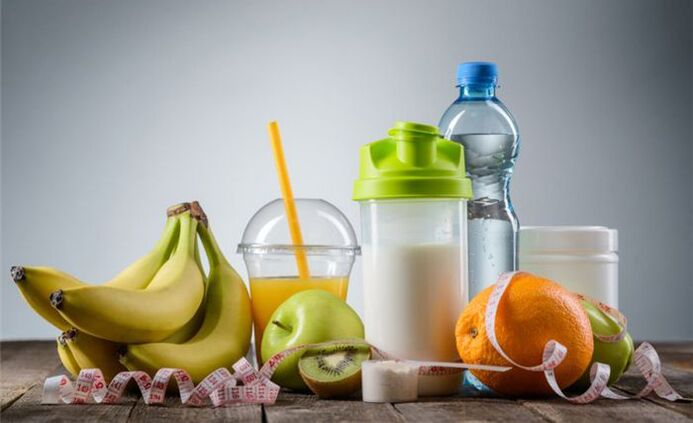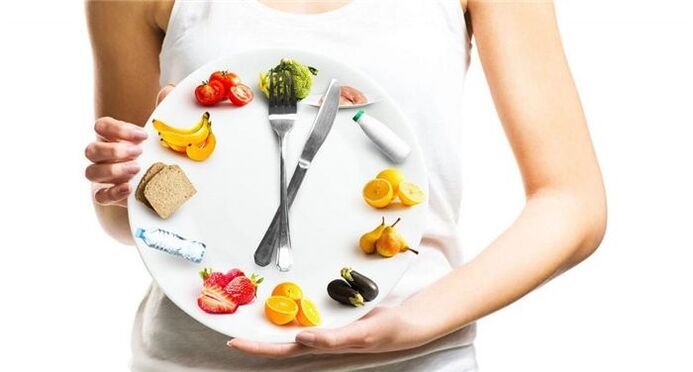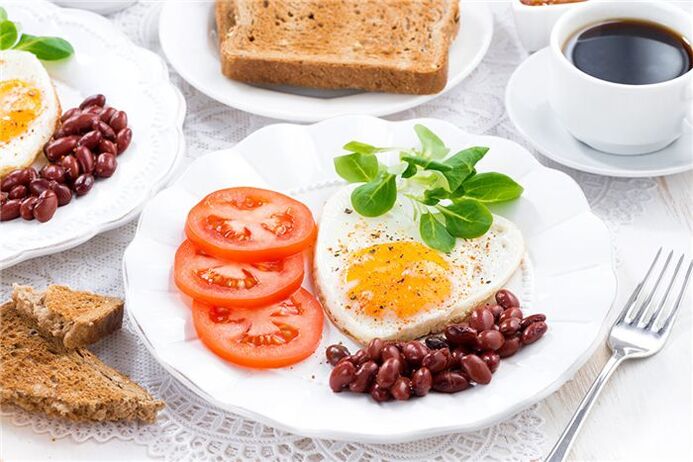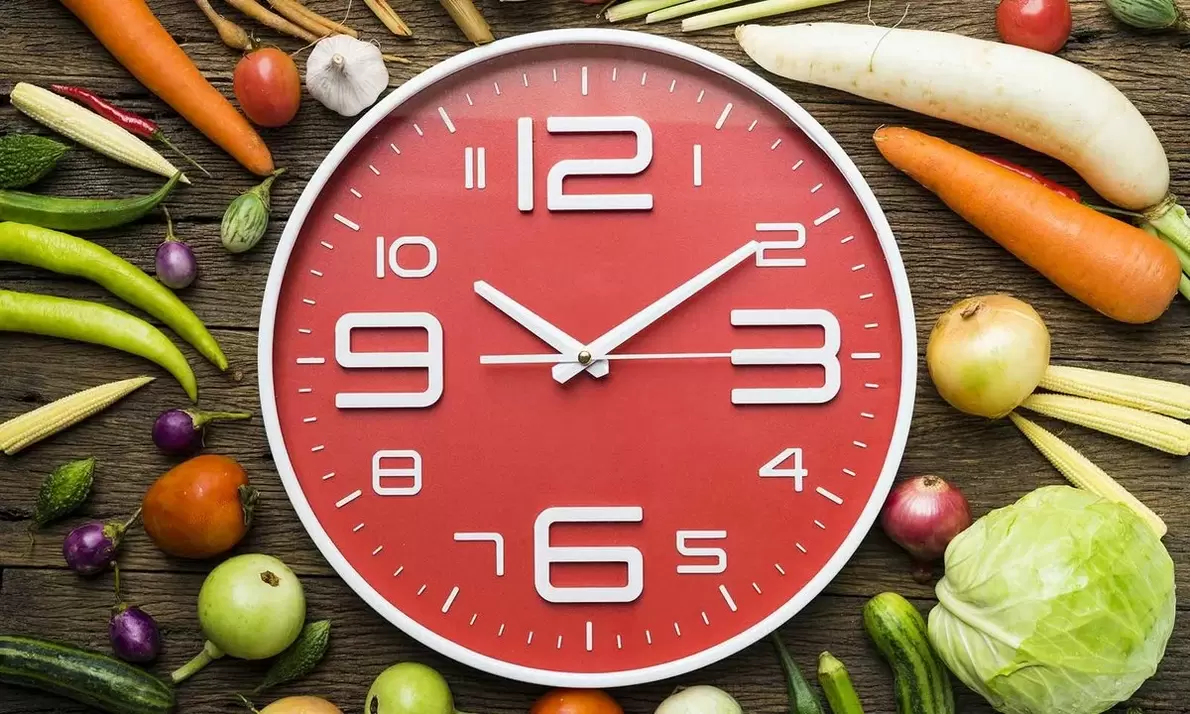
According to the proper nutrition system (PN), a diet for weight loss can be treated differently. You can criticize and find fault with it, or you can fanatically follow it all your life and enjoy your appearance. But the fact that the PP system is effective and has helped thousands of obese people who have given up is a fact that has been proven over time and confirmed by nutritionists.
Proper nutrition is not only about cabbage salads and steamed fish. The PP system has created millions of recipes for breakfast, lunch and dinner, many of which meet the needs of the body and deserve to be included in the proper nutrition plan of every person!
PP program
- Pay attention to the "food pyramid", so 40% of the food on your table should consist of complex carbohydrates (this includes whole grain bread, all types of cereals except semolina, as well as cereals), 35% fresh and steamed. or cooked vegetables and fruits, and 20% are healthy proteins (lean meat, any kind of poultry and fish, fermented milk and dairy products). The remaining 5% can be obtained from fats and sugar.
- Combine meat with vegetables and fruits.
- If you really want, then you can eat a little sweet. But do not exceed the permissible limit of sugar-containing products per day - 5 teaspoons. Better yet, replace sugar with honey. All desserts can be consumed only in the first half of the day in order to find time to burn the calories taken before the evening.
- Make sure your body gets enough protein (a person needs at least 100-150g per day). Protein is the building material that renews cells and maintains muscle performance. If you give up meat and poultry, you should consume plant proteins, which are abundant in legumes, nuts and soy.
- Avoid processed foods, fast food and sauces, as well as canned goods. Sugar and salt are added in large quantities even to ketchup.
Deadlines
Each diet can only be used for a limited time. After the results are obtained, you should switch to a healthy diet. If you start sticking to proper nutrition, you won't have to give up your favorite and unhealthy foods at all. However, you should strictly control the duration and volume of consumption of such products, as well as compensate their caloric content with physical activity.
Proper nutrition is so healthy and beneficial that you can and even need to follow it throughout your life for the sake of a slim body and healthy appearance.
It's time to create a menu for yourself!
What nutrition can be called correct?
Proper nutrition (sometimes called healthy) consists of eating only natural foods that are good for the body. According to this principle, a person who plans to eat should have foods with the right amount of nutrients in his diet. We are talking about the following components:
They need to be counted to meet the daily requirement. It is also important to follow other rules that make nutrition correct. So fast food, processed foods, carbonated drinks and other unhealthy foods should not be included in your diet. It is recommended to limit the amount of salt, exclude fried foods, steamed or boiled foods, and cook stew or bread. You should eat at the same time every day.
How to create a menu for the week
The peculiarity of proper nutrition is that it does not involve following a strict menu. It should be designed taking into account a person's characteristics and food preferences. The main thing is to follow the basic principles of combining products. We are talking about the following rules:
- breakfast should be rich in carbohydrates;
- dinner should contain a lot of carbohydrates;
- Each meal should contain foods with fiber (vegetables, fruits, bran);
- if you want to eat sweets, this should be done only in the first half of the day;
- It is important to distribute calories correctly.
Typically, dieters prepare a menu a week in advance and then simply prepare the meals that go with it. Below is an example of such a diet, where the necessary products have already been selected. Of course, changes can be made if, for example, a person does not eat a certain type of food.
How to make a meal plan for weight loss
Individual planning of your own menu for the day, week, month will help to develop the habit of eating in a correct and strictly defined manner. Fraction - at least 3 times, preferably 5-6 times a day - is the key to dietary food discipline. There is no need to disrupt or rearrange your usual daily routine. Trust your lifestyle when creating a plan.
Eating patterns for "early risers" (for example, people who wake up at 6: 00 a. m. and go to bed at 10: 00 p. m. )
- Have breakfast at 7: 00 am
- Have a second light breakfast at 10. 00
- 13. Go to lunch at 00
- 16. 00 afternoon tea
- Have dinner at 19. 00
Diet for "night owls" (people who get up after 9: 00 a. m. and go to bed at 12: 00 a. m. )
- Have breakfast at 10: 00 am
- 13: 00 lunch time
- 15: 00 is lunch time
- Go to afternoon tea at 17. 00
- At 20. 00 it's lunch time
So adjust your meal schedule to your daily routine.
Basic recommendations
- You should eat breakfast one hour after waking up
- Drink 250 ml of warm water in the morning on an empty stomach.
- Leave 2-3 hours between any meals
- eat dinner before bed or no later than two hours
To properly lose weight, you need to track the calories of all the foods you eat. For this, get a notepad or a special app on your phone and even record the amount of water or juice you drink.
What is important when creating a menu
- Make a grocery shopping list right away while planning your weekly menu. And immediately decide what to cook on which day. On certain days, for example, chicken and fish should be included. One day a light vegetable salad for dinner, a hearty beef steak for lunch, and so on.
- Even if you don't feel hungry, you shouldn't skip breakfast. Every breakfast should be balanced and nutritious - 50% of the daily carbohydrate intake should be at breakfast, 30% should be left for proteins and 20% for fats.
- Dinner should consist mainly of proteins. For example, low-fat cottage cheese, baked chicken or steamed fish.
- Afternoon snacks and second breakfast are proper and balanced snacks between main meals. But they should not become a complete meal. For a snack, prepare fresh fruits (can be a banana, 150-200 g of grapes, one large apple), fresh or boiled vegetables (cabbage, tomatoes, carrots, radishes, etc. ), dried fruits or nuts (the latter should be). without salt and should not be bulky). more than 30 g per dose).
- When calculating calories, subtract those burned during physical activity. For example, if you intend to walk around the city all day or have planned a long-distance cyclocross, increase your diet for that day. Plan for the right amount of carbs and protein and eat a good breakfast before you leave home.
- Drink plain drinking water - not chilled or boiling water (it cleans the gastrointestinal tract and starts metabolic processes). Green tea is useful for those who lose weight (it accelerates metabolism, satisfies the body's need for antioxidants and perfectly suppresses appetite).
- You can drink coffee, but high-calorie variations (latte or cappuccino) only before lunch.
Weight loss mistakes
- Splits for sweets and starchy foods (they should not be completely excluded, but dose the intake so as not to violate the daily calorie intake norm).
- Fried and smoked. Such heat treatment of food is possible if you fry it without oil, over an open fire, and smoke it naturally (not with artificial smoke) for no more than 20 minutes.
- Prefer raw vegetables and fruits to boiled and baked foods, use all kinds of greens to the maximum.
- A heavy lunch with large portions. Boil or bake meat or fish, do not forget to add fresh vegetables (for example, 200 g of boiled beef with one fresh cucumber).
- Drink alcohol often. It should be avoided because it is quite high in calories and can cause a strong feeling of hunger.
- You should not drink water while eating. The same goes for tea or juice. Brew a cup of tea only one hour before and half an hour after meals.
- Be careful with salt, spices and sauces. All this greatly stimulates the appetite and can lead to disorders and overeating.
- Meals are not to be missed. Always have a bag of walnuts, lemon water or a handful of raisins with you. Thus, you will curb your appetite and avoid overeating during a delayed meal.
Sample menu for the week
The first day
Breakfast: rice 200 g, oil 10 g, a banana or an apple, black coffee.
Snack: dry brown bread, boiled eggs, tomatoes.
Daily meal: steamed mackerel 200 g, Chinese cabbage salad with peas and sunflower oil 180 g.
Second snack: low-fat cottage cheese 120 g, a spoonful of 10% sour cream, green apple, 200 ml of tea.
Dinner: boiled vegetables 220 g, boiled beef 140 g
The second day
Breakfast: a piece of cereal bread, a sandwich made of cream cheese and plastic cucumber, 100 g of grapes, tea or coffee with honey.
Snack: 50 g of cottage cheese with a teaspoon of honey.
Daily meal: meat broth 200 g, fresh Chinese cabbage salad with cucumbers and tomatoes, seasoned with lemon juice.
Second snack: red apple and a kiwi, green or herbal tea.
Dinner: lean beef 200 g, two fresh cucumbers.
Wednesday
Breakfast: boiled oatmeal without milk - 210 g, a spoonful of honey, avocado and coffee without sugar.
Snack: pine nuts or walnuts 60 g, green apple, tea, lemon slice.
Daily meal: 150 g of brown rice, the same amount of steamed vegetables.
Second snack: cottage cheese stew, semolina, 150 g of banana, herbal tea.
Dinner: 200 g of peeled seafood, two cucumbers and one tomato.
The fourth day
Breakfast: oatmeal with milk 200 g, fresh raspberries, blackberries, blueberries or strawberries - 100 g.
Snack: 100 g of low-fat unsweetened yogurt, a teaspoon of honey and freshly brewed black coffee.
Daily meal: cooked low-fat fish 250 g, sauerkraut 130 g.
Second snack: spicy tomato with low-fat sour cream, cucumber salad 200 g.
Dinner: 200g skinless baked chicken, sprinkled with 30g Parmesan, plus two cucumbers.
Friday
Breakfast: 200 g of mashed potatoes in water with the addition of 30 g of butter, one boiled egg, one cucumber.
Snack: green tea and two kiwis.
Daily meal: 260 g of mushroom soup with barley, a slice of dried bread or crackers and 10 g of cheese.
Second snack: homemade cottage cheese, raisins and yogurt 150 g.
Dinner: cooked hake 200 g and seaweed 100 g.
Saturday
Breakfast: scrambled omelet with two eggs and 150 ml of milk, freshly brewed black coffee.
Snack: grapefruit or pomelo.
Daily meal: boiled potatoes 150 g, champignons 100 g, boiled chicken 70 g.
Second snack: kefir or low-fat drinking yogurt 200 ml, one green apple.
Dinner: low-fat cottage cheese 150 g without added sugar, two apples baked in the oven.
The seventh day
Breakfast: millet porridge in water 200 g butter with 30 g, a glass of black tea without sugar.
Second breakfast: kiwi and banana.
Daily meal: steamed vegetable stew + 20 g of cheese - 250 g, boiled chicken fillet - 100 g.
Second snack: boiled shrimp 200 g, carrot or tomato juice 200 ml.
Dinner: steamed fish cutlet 150 g, boiled white rice 100 g, one tomato.
How to start eating right
The acceleration of the pace of life and the abundance of products on store shelves, as well as in fast food chains, advertising, convenient to use, but not useful, often harmful products make many people think about how to start. eat right and include this item in your daily schedule.
As well as knowing how to divide and balance your menu most effectively, it's also useful to consider the psychological aspect and ensure you have the right approach to changing your eating habits. Whatever the goal of the diet - to realize the desire to lose weight or improve well-being - it is very important to form the right attitude to the problem.
Therefore, you should not:
- expect to instantly improve your health, completely change your food choices and habits in an instant;
- Focus on several complex tasks at the same time;
- give up all the usual foods at once;
- to end the adaptation of the diet and to subordinate the whole way of life to it;
- It is better to focus on thoughts about food, to direct the energy of the mind in another useful and important direction.
Why you need to eat right
Adherence to the daily routine and diet, the absence of bad habits and adequate physical activity are the main conditions for keeping the body in optimal condition. Often, these simple truths are not remembered until health problems begin, depriving a person of the opportunity to enjoy everyday life.
For those struggling with excess energy and stamina, excess weight, poor sleep, poor skin and hair, or any other wide range of disorders caused by an unhealthy lifestyle. it will be vital to make a decision about their prevention, to switch to a balanced diet without delay, and to follow it in practice.
The basis of a healthy lifestyle was and remains proper nutrition. The substances that enter our body with food serve as the main source of energy and raw materials for the tissues of our body.
A necessary start would be to prepare a proper diet for the day.
Rules for choosing a diet for the day

Creating a balanced menu is quite simple. Having decided to improve your health and correct your figure, you should pay attention to the quality, quantity and time of food intake. Food should be fresh, diet should be varied and properly distributed throughout the day.
- It is better to start eating more often and in small portions (4-6, not three times).
- Do not eat too much before going to bed.
- Include vegetables in every meal.
- Drink more plain still water.
- Reduce the amount of simple carbohydrates.
Your decision to stick to a healthy diet will be rewarded with health, overall well-being, weight loss and enhanced immunity.
The correct diet for the day should follow a model where the first meal is denser than all subsequent meals.
For beginners, it is important to gain an understanding of the substances and their ratio that each body needs to function properly. The key to a balanced menu is the right combination of proteins, fats and carbohydrates, as well as trace elements such as magnesium, calcium, potassium, various vitamins and iron.
Start the day with a tasty and healthy breakfast

The first thing that enters the body should be plain, not cold water (with the addition of natural fresh lemon juice, if the acidity of the stomach allows it). This will help to revive and prepare the digestive system for further work. It is also useful for quickly removing waste from the body, losing weight and improving the condition of the skin.
A glass of water should be consumed correctly - about thirty minutes before meals, slowly, in small sips.
Contrary to popular belief, one nutritionist's advice for breakfast is to exclude sweets from it. This is because when you take in a portion of glucose, the body requires the next portion a little later, when the first arriving sugar is processed by the digestive system.
How to choose a healthy lunch
According to nutritionists, a meal in the middle of the day should contain 25-50% of the total energy value of the daily diet.
To make your lunch as healthy as possible, you should remember the following recommendations:
- the beginning of the meal is soup;
- drink hot (except cold) drinks;
- the interval between lunch and the previous meal should be at least 2-3 hours;
- It is useful to balance a very filling lunch with a light dinner.
In no case should you neglect a full lunch.
What is better to eat for dinner?
Dinner with a balanced diet contains minimal calories. Carbohydrates should be avoided. However, this food should not be completely excluded from the diet - it causes serious disturbances in the work of the digestive system.
You can prefer natural yogurts, steamed poultry dishes, cottage cheese stews, seafood.
A good choice would be a protein omelet or a small portion of legumes - beans, lentils, peas.
The key to success will be a combination of nutrient-dense foods and their low-calorie content.
How many calories and minerals should the body consume?
The calories needed by the body are calculated using formulas that contain information about the following parameters of a certain person:
Particular attention should be paid to the current state of the body, professional stress, lifestyle and the goal set by a person who decides to eat right. If he is driven by the desire to lose weight, the normal indicators decrease by 20%, if he tries to gain muscle mass, it increases by the same amount.
Average standards suggest that women consume 1, 000 to 2, 000 kcal per day, and men 2, 500 to 5, 000. However, exact calculations must be made individually.
What foods should you avoid when creating a healthy diet?

Adapting the body to a new nutritional system takes time, like creating any habit. If you can't eliminate all junk food at once, you should do it gradually, giving yourself something from the forbidden list once a week.
It will help you relieve stress and have fun. However, this weakening should then be compensated by increasing the amount of vegetables, fruits and clean drinking water.
Here is a list that will help you limit unhealthy foods in your diet:
- rich, yeast-based and fortified baked goods, breads and wheat bread (it would be better to give preference to whole grains and rye without yeast);
- confectionery products;
- sausage products;
- mayonnaise and sauces based on it;
- canned meat and fish;
- smoked and salted meat dishes;
- egg yolk;
- foods high in animal fat;
- alcohol;
- fast food, semi-finished products;
- carbonated drinks, especially sweet, containing dyes and flavors.
It is especially important to understand the importance of freshness of produce and prepared foods. Even healthy foods can be harmful if not prepared properly. Always prefer boiled and steamed fried foods.
An example of the correct menu for the day
Everyone's taste preferences are individual. Moreover, it is difficult to create a menu correctly for a long time. But once you get on the path to correcting your diet, you will gradually learn many recipes and new dishes, and you will be able to choose the ones that are more preferable for you.
A day's worth of food might look like this:
- for breakfast, you should also add boiled eggs with buckwheat porridge, natural cocoa, fresh apple or orange as a drink;
- for dinner - sour soup, steamed, boiled or baked chicken meat without adding fat, preferably fillet, a piece of rye or rye-wheat bread, green tea with honey or lemon;
- you can eat cottage cheese with fresh berries or fruits during the afternoon snack;
- A great dinner would be lean meat (uncooked) and vegetables.
For snacks, you can turn to vegetables and fruits, and in case of extreme hunger, nuts and seeds. We must not forget the daily consumption of normal water (about 2 liters), which is necessary for health.
Weekend
Some people believe that they can allow themselves to deviate from the diet on the weekends and eat unhealthy foods that are not on the diet on other days. This idea is wrong, because such an action can negate all the advantages of the previous menu. Of course, sometimes you can buy something not very useful, but in small quantities. Heavy meals can be consumed on holidays, but not every weekend.
In the correct nutrition mode, the menu for Saturday may look like this:
- Breakfast includes oatmeal and baked apples. You should use tea as a drink. It is important to understand that you should not add sugar to tea. If you want to sweeten the drink, it is recommended to use honey.
- Second breakfast - yogurt and banana.
- You can make chicken soup with vegetables for dinner. Experts recommend choosing fish as a second meal. Salad - vinaigrette. The drink is compote.
- For an afternoon snack, you can eat yogurt and add nuts to it. You can opt for dried fruits instead.
- A great option for lunch would be ham and vegetable stew. Drink is tea.
You can treat yourself to cottage cheese stew for Sunday breakfast. It should be seasoned with honey. You can also eat toast with tea. For the second breakfast, you can choose yogurt and crackers. Lunch consists of borscht, chicken cutlet with buckwheat, compote. An excellent option for an afternoon snack, as always, would be cottage cheese with the addition of dried fruits. It is recommended to eat boiled beef and vegetable salad for dinner.
What to do if you don't have enough time to cook

Consistency is the key to success for healthy eaters. Only long-term lifestyle changes can bring real benefits. The pace of modern life of a working person often does not leave much time. You should never give up on your decision to be healthier or your desire to lose weight.
The beginning of the journey is always the most difficult, we often give up before we begin due to limited time and energy resources, but there are professionals ready and willing to provide competent assistance.
If you don't have time to take care of your meals, you can order ready, fresh and well-balanced meals for delivery. It is very easy to choose food for yourself from the section that suits your goal (lose weight, keep fit after a diet, increase muscle mass, etc. ). A menu with a detailed description of the composition of the products and the nutrients in them is offered for the calendar and the working week.
We will deliver healthy, fresh food that you can eat at work or at home, according to your wishes. Comfortable serving conditions will allow you to enjoy a variety of balanced dishes, many of which you cannot prepare yourself without spending time and effort in the kitchen.
The ability to use the services offered by respected and competent specialists will eliminate the need to study numerous videos, look at pictures and read articles to expand your culinary range.
There's no reason to put off your healthy eating plan. Do it today.














































































